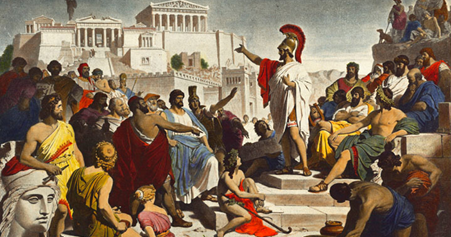
While the public sphere has always been somewhat hostile to contrarian opinions, there has been one place stubbornly free of this danger – the university. At around the time that Orwell expressed his fears about the loss of intellectual freedom in the West, the American Association of University Professors adopted an important document known as the ‘1940 Statement of Principles on Academic Freedom and Tenure’.
The document said: “Institutions of higher education are conducted for the common good. […] The common good depends upon the free search for truth and its free exposition.” In 1970, an addition to the text explicitly stated that controversial speech should not be discouraged: “Controversy is at the heart of […] free academic inquiry.”
Academia has been the bastion of the freedom of thought and speech that first emerged in Ancient Athens, because of the conviction that unconstrained intellectual freedom is the engine of both scientific advancement and societal progress. The university, for more than 2,000 years, has been a place for experimentation – the only place, in fact, where one had the right to be wrong.
In its search for truth, scientific reason has not been weighed down by what Immanuel Kant described as “the scandal of reason” – the propensity of reason to waiver between dogma and uncertainty. On the contrary, the advancement of knowledge has been animated by that very scandal, as I have argued in my exploration of critical judgment.
Importantly, freedom of speech has been a weapon for fighting oppression from two sources: central authority and public opinion. John Stuart Mill famously observed that the chief threat to free speech in democracies was not the state, but the “social tyranny” of one’s fellow citizens. This is what Orwell was alluding to when he decried “the general weakening of the Western liberal tradition”, appalled at ‘how easily totalitarian propaganda can control the opinion of enlightened people in democratic countries”.
Safe speech and safe spaces
The university has consistently been a fortress, sheltering freedom of speech from both prevailing public opinion and the intrusions of political authority. And yet, in a curious shift, over the past decade universities have transformed into spaces for safe speech – as students claim that the university is akin to a home.
College campuses in the US and Europe have experienced major student protests, because some students feel that absolute freedom of speech on campus promotes a hostile environment that harms minority students and hinders their ability to learn.
They have argued, compellingly, that denying hateful or historically ‘privileged’ voices a platform is necessary, so that the marginalised and vulnerable can finally speak up. They demand censorship and prohibitions against giving offence.
As a result, universities have created ‘safe spaces’ in which offensive or disagreeable speech is prohibited and punished. ‘Cancel culture’ and ‘de-platforming’, codifying ‘protected categories’ of students: these are all now part of university life. The ‘equal respect agenda’ is enforced through disciplinary and grievance procedures, and ‘safe space marshals’ patrol events looking for macro- and microaggressions.
Fighting dogma
Is this the end of free speech in the university? I don’t think so. We can resolve the deadlock between safe speech and free speech if we remember the original mission of free speech. It was not meant as a tool of information, but one of liberation; it was conceived as a political weapon – a weapon against the oppression of dogma and the abuse of power.
To quote George Orwell again, freedom of speech is a right to express “what one believes to be true, without having to fear bullying or blackmail from any side”.
